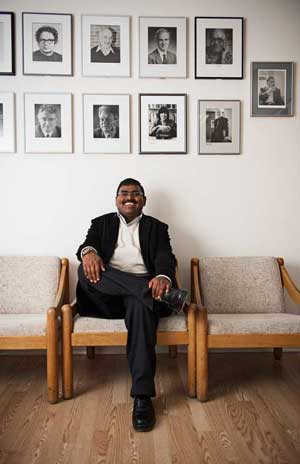Chinnaiah Jangam reflects on the legacy of B.R. Ambedkar on contemporary India’s democracy

Assistant Professor Chinnaiah Jangam has written an article for livemint entitled “Caste in the time of right-wing politics“. Below is a short excerpt of the article with the full text available online.
More than 60 years after the adoption of the Constitution and the implementation of a constitutionally mandated reservation policy, India has reached a critical point. After coming to power in 2014, the Bharatiya Janata Party (BJP) government—taking the cue from its parent organization, the Rashtriya Swayamsevak Sangh (RSS), which aims to turn India into a Hindu Rashtra—has been promoting Brahmanical Hindu rule. Attacks against, and killings of, Muslims and Dalits, on the pretext of protecting cows, have become routine across India. From the public lynching of Mohammad Akhlaq in 2015 on suspicion of killing a cow, to the lynching of Dalit men in Una, Gujarat, for skinning a dead cow in 2016, to the killing of a Dalit youth in Timbi village, once again in Gujarat, in March for owning and riding a horse—this demonstrates the pattern of violence, reported in the mainstream media.
According to the National Crime Records Bureau, a crime is committed against Dalits every 15 minutes and six Dalit women are raped every day—a shocking majority of these go unreported. Much of this violence is committed by organized gangs and their henchmen under the guise of gau rakshaks and Hindutva organizations, which use provocative religious symbols and abusive caste language. The most disturbing aspect of the violence is the impunity with which it is committed in public and shared on social media. Some members of the ruling party have responded with insensitive remarks.
As a Dalit, watching these developments from a distance not only gives me a feeling of despair but also challenges my ethical position as a scholar of Dalit studies. It is in this context that I reflect on my journey as a first-generation educated Dalit from a small village in Telangana to provide a perspective on the diminishing prospects for Dalits, minorities and other oppressed sections of Indians. I am primarily a product of post-independent India’s reservation policy, and proof of the triumph of B.R. Ambedkar’s vision. As we celebrate another birth anniversary of Ambedkar today, it is important to reflect critically on India’s progress as a democracy, and whether it has been able to stand up to the principles of social inclusion and the guarantee of equality and dignity for its vulnerable citizens. This is pertinent not just as an exercise in nostalgia for Ambedkar, or just as an exclusive Dalit agenda, but because India’s journey as a democracy seems to be in peril.